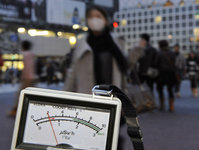Radiation level in seawater off nuclear plant "Fukushima-1" exceeded 1250 times
 Levels of radioactive iodine in seawater just offshore of the embattled Fukushima Daiichi nuclear plant spiked to more than 1,250 times higher than normal, Japan's nuclear and industrial safety agency said Saturday.
Levels of radioactive iodine in seawater just offshore of the embattled Fukushima Daiichi nuclear plant spiked to more than 1,250 times higher than normal, Japan's nuclear and industrial safety agency said Saturday.
Samples taken Friday morning from a monitoring station 330 meters off the coast were significantly higher than results from the previous morning, when the level was 104 times above normal, according to CNN International.
Fukushima nuclear plant operator was reportedly said that highly radioactive water at 10,000 times the normal level has seeped from a second stricken reactor building. Operations have continued to restart the cooling systems at Fukushima's six reactors to try to avoid a major radioactive release.
Yesterday, the Japanese government asked people living within 30 km of the damaged Fukushima plant to leave the area.
However, the Tokyo Electric reported today that the radiation levels at the plant's main gate were 0.219 millisieverts per hour, indicating a significant drop from readings taken at the same place over the past week, RTT News reports.
"This is a relatively high level, but the impact on marine life and seafood would be minor, as radioactive material released into the sea will significantly spread due to tides by the time they are consumed by marine species," the nuclear agency said in a news conference.
"If people drink 500 milliliters of water containing the same level of radioactive iodine, the radiation levels would reach the 1 millisievert limit which people can take safely in one year," the agency explained.
It also said there will be no significant impact on fishery products, given that fishing is no longer conducted within the 20-kilometer evacuation zone, Eurasia Review informs.
Subscribe to Pravda.Ru Telegram channel, Facebook, RSS!




